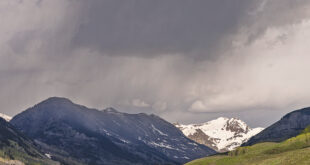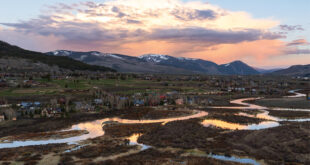One of the last times I went trick-or-treating, a blizzard slammed St. Paul, Minnesota. One of my friends dropped her candy, and I have vivid images of our whole group on the ground, digging through the snow with bare hands while she dug away with a canoe paddle. (She was dressed as a canoeist, and if you know anything about Minnesota, lake country and camp culture, this is not weird.)
The ink on the candy wrappers ran, but we managed to salvage most of her haul and Halloween was made even better by the snow day that followed. No school. Stranded cars. A digging out that challenged even the most northern state in the lower 48—local newspapers still run anniversary stories about the Halloween Blizzard. I never saw anything like it again, and I certainly never expected to see a place like Crested Butte and the Gunnison Valley brought to a near standstill by snow.
Despite the challenges brought on by this latest storm cycle, I can’t help but feel a thrill at living in a place that can get so much snow, and where the people celebrate its arrival. I also have no doubt that managing editor Mark Reaman, who is on a beach in Costa Rica, likes the surfing and ocean sunsets but hates that he isn’t here to be part of the mayhem.
I wouldn’t be surprised if he’s been following the news and Crested Butte council discussions on vacation, perhaps even composing an editorial or two in his mind. An article of his took a bit of a beating at a work session addressing the Vinotok fire. Some individuals took issue with the way it presented council comments on the 2016 Vinotok bonfire and concerns that it was not built to plan.
I understand how the article might have surprised many Vinotok volunteers and even caused them to feel like the fire, and by association, they themselves were under attack. I’ve since re-read it, however (Mark would be the first to tell you that part of my job is telling him when to tone it down). And in this particular case, I can’t agree that it was nasty.
There were some hard-edged quotes, but I think it clearly presented where things are at with the Vinotok fire: Vinotok organizers and the council need to figure out how to work together. There is enough concern about fire management that the council is between a rock and a hard place when it comes to approving future fires at the Four-way.
It’s a frustrating place to be for Vinotok organizers, councilmembers and staff, and as far as I can tell, there’s good reason for frustration on all accounts. I can’t speak from decades of experience with the event, but if I understand it right, Vinotok folks want to feel heard and appreciated for what they add to the spirit of town. And the Town Council wants to feel like it has a partner as committed to addressing bonfire safety concerns as the council has to be.
(And, as often happens in cases like this, I suspect the council would say that it does appreciate Vinotok, and that Vinotok organizers feel like they are addressing safety.)
As I listened to the Vinotok discussion, and then a two-and-a-half hour discussion on short-term rentals—both of which impact the character of this town and draw a lot of passion out of people—I couldn’t stop thinking about the nature of all the public meetings I’ve covered for the paper.
I’ve attended and written about county commissioner meetings, the Gunnison County Planning Commission, the Mt. Crested Butte Town Council, the RTA, and of course, the Crested Butte Town Council. I’ve listened to White Pine residents implore the Planning Commission to remember their homes when considering proposed mining. I’ve seen business people let the RTA know that access to flights is critical to their livelihoods. I’ve witnessed impassioned Mt. Crested Butte homeowners speak up about their property taxes.
I’ve seen people read prepared statements, speak straight from the heart, and speak so much from the heart that they don’t quite make sense, stumbling over their words and ideas. I’ve seen these words change the course of this valley, and I’ve seen people speak long past the point that they can change the outcome.
No one seems to understand the value of appearing at public meetings more than people in Crested Butte. I see more citizens and more passion in front of the Crested Butte council than I do in most other meetings. It’s pretty cool to live in a community where everyone is that invested in the outcomes—that impassioned about what this place is and what it becomes.
It’s perhaps why I was so surprised to go from the Vinotok fire discussion, which (pun intended) got so heated, to the short-term rental discussion. It was long. People felt passionately about the subject and support many different approaches to regulating short-term rentals (if they want them regulated at all). There’s some impatience, perhaps, at how long this discussion has gone on, and they’re certainly not all happy with the way the proposed ordinance is coming together. But the atmosphere in the room was so… tame. Even respectful. (Not to doubt us, Crested Butte. I know we’re all capable of this—I was just ready for fire and brimstone!)
I’m not sure how to repair the trust between Vinotok and the Town Council, especially when that frustration is built on years of back and forth. But I do know this from covering so many meetings: when people go in prepared for battle, a battle is exactly what happens.
The emotion behind it all has this way of creating a sense of urgency. A need to be heard, to be understood, and to get it taken care of right now. Yet for the bonfire and the short-term rental discussion, there’s still time. Words and ideas can still affect outcomes. So maybe it’s okay to let go of that urgency and slow down. To really listen, think, and then speak.
I was reminded of this during the snowpocolypse and being somewhat short-handed at the newspaper (Murphy’s law has this way of striking whenever Mark goes on vacation, so that a ton of stuff happens at once). I felt this sense of urgency building, albeit a different scale from what folks probably feel about STRs and Vinotok. There was my work and Mark’s to cover. And then everything was closing: first the school, then the RTA for a time, and then the lifts, before finally the resort itself. Add to it Western and rumors about the airport, and I needed to get to the office. I needed to move quickly, get one thing done and then the next.
But I couldn’t. I was driving 135 in whiteout conditions. I could barely see the way forward and neither could the drivers around me. It was time for all of us to slow the heck down, get to our destinations in one piece, and then dig out of this storm together.
—Alissa Johnson
 The Crested Butte News Serving the Gunnison Valley since 1999
The Crested Butte News Serving the Gunnison Valley since 1999





